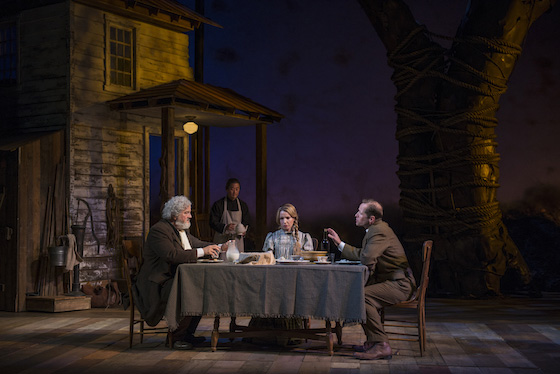Theater Fri Oct 09 2015
Steppenwolf's East of Eden Misses the Forest for the Trees

Francis Guinan, Stephen Park, Kate Arrington, and Tim Hopper in Steppenwolf's East of Eden. Photo by Michael Brosilow.
You remember John Steinbeck. He's the author of those books your high school English teacher forced you to read, Of Mice and Men (if you were lucky) and The Grapes of Wrath (if you weren't). But Steinbeck actually considered those novels "practice" for his true masterpiece, East of Eden, a retelling of the biblical story of Cain and Abel set in World War I-era California.
Steppenwolf's East of Eden adaptation is epic, beautifully rendered, and filled with some memorable performances. But the script by Frank Galati -- the Northwestern alumnus who put Steppenwolf on the map in 1988 with his adaptation of The Grapes of Wrath -- feels like an extended "Previously, on East of Eden" highlight reel. In an attempt to cram as much of Steinbeck's novel as possible into three hours, it loses sight of the real meat of the story, the relationship between two rival brothers and their father.
Nearly three decades since Galati's Grapes of Wrath, Steppenwolf is in the middle of a huge transition after its artistic director of 20 years, Martha Lavey, was replaced by Anna Shapiro in September. Perhaps as a nod to its history, then, the company's 40th anniversary season kicks off with another Steinbeck adaptation, written again by Galati and directed by Terry Kinney, Steppenwolf co-founder and helmer of their 1981 take on Of Mice and Men.
Galati and Kinney's plot closely follows Steinbeck's novel, which was written for the author's sons, as a way to tell them they have a choice in life, that while there is both good and evil present in every person, no one is trapped by fate into repeating the mistakes of their mothers and fathers like the cursed families of Greek tragedy.
The story's wealthy pater familias, Adam Trask (Tim Hopper), moves to a sprawling ranch in California with his beautiful but cold wife, Cathy (Kate Arrington). After giving birth to twin boys, Cathy abandons the family and disappears, leaving Adam and his Cantonese manservant, Lee (Stephen Park), to raise her sons. Adam loses his fortune in an unlucky business venture, becoming the town laughingstock by the time his sons come of age. The boys, Caleb and Aron (Aaron Himelstein and Casey Thomas Brown, respectively), have been told their mother is dead, but Caleb (Steinbeck's Cain) discovers her in nearby Salinas, running the town's most infamous brothel.
Steppenwolf has spared no expense, and this adaptation will likely go down as one of its all-time most beautiful productions. Walt Spangler's scenic design is gorgeous, immersive and cinematic, with entire period-accurate rooms and edifices wheeling on and off the stage, and a versatile backdrop of a massive oak tree looming over a raw, tortured landscape. The costumes are Hollywood quality, the transitions are seamless, and the live harp-and-cello soundtrack creates an atmosphere of appropriate gloom.
Some of the performances, too, are nuanced and memorable, chiefly ensemble members Francis Guinan as a silvertongued farmer, Hamilton, and Kate Arrington's femme fatale, Cathy, a Lady Macbeth in the vein of Ron Rash's Serena. Britanny Uomoleale's turn as Abra, the sophisticated girl who steals the hearts of the twins, is another magnetic but measured performance akin to Alicia Vikander or Rooney Mara, after her starring role in Steppenwolf's Grand Concourse this summer.
Unfortunately, the performers at the center of the story -- Adam Trask and his sons, played by reliable ensemble member Tim Hopper and two relative newcomers -- are hampered by a script that never takes the time to establish who they are, or what they mean to each other. While Galati does an excellent job of finding humor in such bleak source material, this draft of the script doesn't strike the right balance of what to include and what to cut or condense.
The entire first act, for instance, is dominated by Hamilton, the farmer who mentors Adam Trask and helps deliver the sons. Though Francis Guinan's performance is one of the show's best, the time would've been better spent establishing relationships between Adam and his sons. Galati was right to remove the novel's lengthy flashbacks from the script, so why not Hamilton? His dialogue foreshadows many of the play's major themes, but they're also spoken (sometimes ad nauseum and far too directly) by other characters later in the play.
In the second and third acts, we only see the most climactic and explosive encounters in the Trask family, but we never get to see the fuse burning in between. These grand moments feel empty without context. Tim Hopper is great as Adam Trask, but we never see the warmth and kindness that have supposedly endeared him to his sons. Their stories, too, are discussed rather than dramatized. The family manservant, Lee, who sounds a lot like Data from "Star Trek," is also a bit of a misstep, awkwardly emerging from a background player to the deliverer of the play's main themes through the script's most on-the-nose dialogue.
Still, even though the script tells more than it shows and sacrifices intimacy for scale, East of Eden is quite a spectacle, and probably the most ambitious show in Chicago this fall. There's an excellent play contained within Steinbeck's magnum opus, Steppenwolf just hasn't quite assembled the right scenes.
"East of Eden" continues at Steppenwolf Theatre Company, 1650 N. Halsted St., through Nov. 15, every day except Mondays. Tickets run from $20 to $89 and can be purchased online or via telephone at 312-335-1650. The show runs three hours, with two 10-minute intermissions.









Elizabeth / October 11, 2015 12:59 PM
This is not A. Shapiro's first season. This season was put together by Martha Lavey and because of the transition, would be her final season, not Shapiro's first.